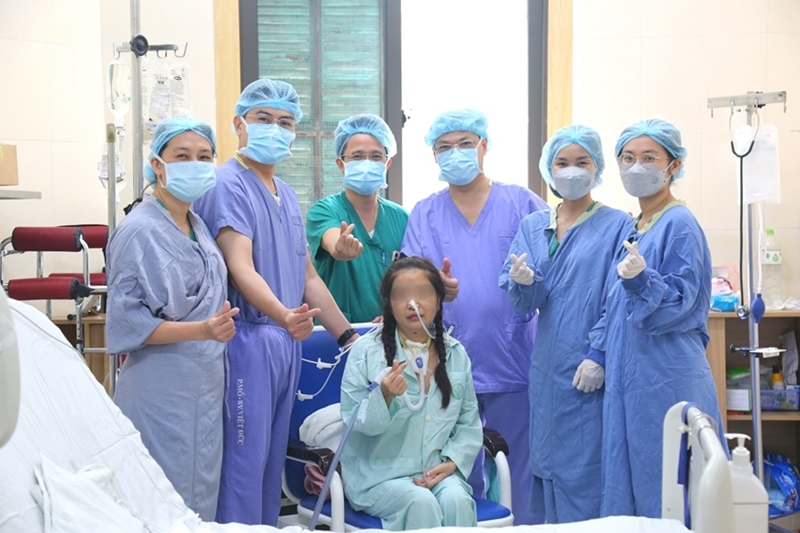Mastering one of most complex multi-organ transplant techniques
Organ transplantation is not only a triumph of medical science but also a symbol of humanity, where the passing of one person gives the gift of life to many others. Doctors at Vietnam German Friendship Hospital have recently achieved a remarkable milestone as they successfully performed Vietnam’s first-ever simultaneous heart–lung transplant. With this breakthrough, the hospital’s medical team has turned Vietnam into few countries that have mastered one of the most sophisticated procedures in modern medicine, offering new hope for patients suffering from multi-organ failure.
Director of Vietnam German Friendship Hospital Duong Duc Hung said that the procedure was a tense, demanding journey lasting for more than 20 days. “We feel relieved and proud that soon we can return a healthy son to a brave mother. This success has raised the red flag of Vietnam on the global map of multi-organ transplantation, particularly in heart–lung surgery,” he shared.
    |
 |
|
Doctors at Vietnam German Friendship Hospital with the patient who received Vietnam’s first simultaneous heart–lung transplant (Photo courtesy of the hospital) |
Earlier, the recipient, 38-year-old Tran Nhu Q., suffered from Eisenmenger syndrome, irreversible right heart failure, and severe tricuspid valve regurgitation. Her health had deteriorated rapidly, leaving her only days to live. The donated organs also posed challenges when the lungs were infected with multidrug-resistant bacteria and were larger than the recipient’s chest cavity. With no time to lose, the doctors decided that surgery was the only chance for the patient’s survival.
During the seven-hour operation, the team used extracorporeal circulation to temporarily replace the function of both heart and lungs. They carefully balanced fluids to prevent pulmonary edema, minimized anesthesia, and used advanced hemodynamic monitoring. The lungs had to be trimmed to fit the recipient’s chest cavity, and surgeons adjusted the airway connection technique to improve blood flow. Every anastomosis was checked by bronchoscopy during surgery, a process requiring absolute precision.
Rapid progress in organ transplantation
From a country that once lagged behind, Vietnam has made extraordinary strides in the field of organ transplantation. The nation’s first transplant, a living-donor kidney transplant, was performed in 1992 at Military Hospital 103, marking the beginning of Vietnam’s journey toward advanced medical techniques.
In the early years, organ transplants were limited to kidneys and livers from living donors, as brain-dead donation was not yet feasible. A breakthrough came in 2010 when Vietnamese doctors performed the first heart transplant from a brain-dead donor, demonstrating the growing capabilities of local medical teams.
In 2020, Vietnam achieved two significant milestones. Doctors at the Central Military Hospital 108 performed first limb transplant in Southeast Asia, also the world’s first from a living donor. That same year, surgeons at Military Hospital 103 successfully completed Vietnam’s first two intestinal transplants. With this, Vietnam joined a group of about 20 nations capable of transplanting all six vital, non-regenerative organs of kidney, liver, heart, pancreas–kidney, lung, and intestine.
In 2024, Vietnam German Friendship Hospital achieved another medical breakthrough with Vietnam’s first simultaneous heart and liver transplant, a procedure previously performed only in a few advanced medical centers in the United States and Europe. This year, the hospital made history again with the country’s first successful simultaneous heart–lung transplant.
Heart–lung transplants are extremely rare in the world due to the scarcity of suitable donors and the high risk of complications. They are reserved for patients with both end-stage heart and lung diseases, such as complex congenital heart disease with Eisenmenger syndrome or severe pulmonary hypertension leading to irreversible heart failure. Globally, only about 100 such procedures are performed each year.
At leading international centers, survival rates have improved steadily. In the U.K., the 90-day survival rate is about 85% and 1-year survival is 72%. In the U.S., the 1-year survival rate is nearly 90%. Many international reports also show that the 5-year survival rate after transplantation is about 60%, demonstrating the effectiveness of this method.
Ha Anh Duc, Director of the Department of Medical Service Administration under the Ministry of Health, said these achievements are not only a triumph for the hospital but also a proud milestone for Vietnam’s medical field. “Although we started later than many countries, Vietnam now stands shoulder to shoulder with the world’s medical powers in organ transplantation. The expertise, coordination, and determination of our doctors have made these remarkable successes possible,” he said.
Translated by Tran Hoai